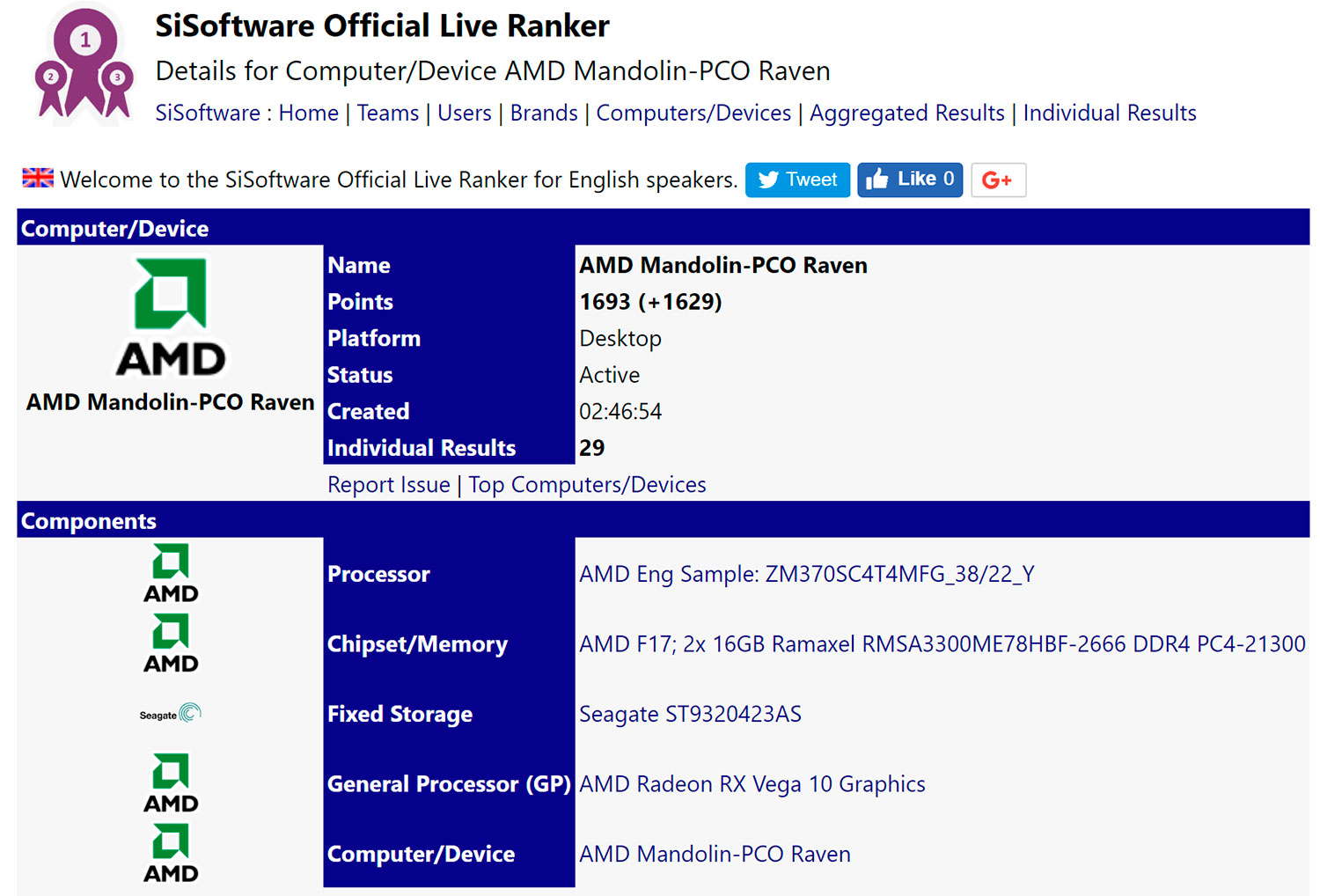AMD Ryzen 7 3700U APU Spotted With Similar Specs to 2700U
AMD released a couple of patches for its AMDGPU DRM Linux driver back in September whereby one of patches added support for the future Ryzen 3000-series APUs (accelerated processing units), codenamed Picasso. Today, an iteration of this APU has appeared in the form of the Ryzen 7 3700U, which has shown up in SiSoftware's and UserBenchmark's processor databases.
Based on the databases, the Ryzen 7 3700U (part number ZM370SC4T4MFG_38/22_Y) is a quad-core chip with eight threads. The APU ticks at 2.2GHz with a boost clock that escalates to 3.8GHz. It also has 2MB of L2 and 4MB of L3 cache. Curiously, those specifications are identical to those of the current Ryzen 7 2700U. So, it's safe to assume the Ryzen 7 3700U could carry the same 15W TDP (thermal design power) rating as well.
We're uncertain about the Ryzen 7 3700U's integrated graphics, since SiSoftware and UserBenchmark couldn't agree on the subject. The first recognized the Ryzen 7 3700U as having Radeon RX Vega 10 graphics, while the second claimed the APU utilizes Picasso graphics. Radeon RX Vega 10 graphics features 10 compute units, 40 TMUs (texture mapping units), 8 ROPs (render output units) and 640 stream processors clocked up to 1,300MHz, but then this also would mean that the Ryzen 7 3700U is nothing more than a rebrand.
The Ryzen 2000-series APUs, codenamed Raven Ridge, are based on the Zen processor microarchitecture and manufactured under GlobalFoundries' 14nm production process. At the time of writing, there is no concrete evidence on which microarchitecture AMD will employ for the upcoming Ryzen 3000-series APUs; however, an alleged AMD PowerPoint slide claims Picasso will utilize a similar architecture to Raven Ridge. AMD's own Linux patch seems to back up this notion, as the description reads: "Picasso is a new APU similar to Raven." We suspect Picasso will most likely use the refined Zen+ microarchitecture and produced with GlobalFoundries' 12nm node, rather than the latest Zen 2 microarchitecture.
But truth be told, we would love to see what an APU can do under AMD's Zen 2 microarchitecture and 7nm node. The California-based chipmaker is already the first to produce 7nm products with its EPYC Rome server processors and the Radeon Instinct MI60 and MI50 accelerators.
Get Tom's Hardware's best news and in-depth reviews, straight to your inbox.

Zhiye Liu is a news editor, memory reviewer, and SSD tester at Tom’s Hardware. Although he loves everything that’s hardware, he has a soft spot for CPUs, GPUs, and RAM.
-
Giroro Since it's an engineering sample, the specs could change. Maybe they are experimenting to see if a 2700u works as expected when copy-pasted into the 12nm process, before making any of the planned changes.Reply
The disagreement on the integrated graphics could be explained by different configurations being tested. -
bit_user Cool. I've been waiting for the 12 nm refresh of their desktop APUs. Once they fulfill laptop orders, the desktop SKU is probably next.Reply
-
tnruiqin29 I dream of a six core APU running 80fps on a 1080p ultrawide. Someday, maybe might come true...Reply -
bit_user Reply
Well, you can't buy it socketed, but you could probably source a grey-market import of one of these:21491010 said:I dream of a six core APU running 80fps on a 1080p ultrawide. Someday, maybe might come true...
https://www.anandtech.com/show/13381/subor-z-console-pc-hybrid-fireflight
https://www.anandtech.com/show/13163/more-details-about-the-zhongshan-subor-z-console-with-custom-amd-ryzen-soc
They have both a console and a PC version that runs Windows. The GPU should be a little weaker than XBox One - somewhere between a RX 560 and RX 570.
However, for the price, you're probably better off building a cheap Ryzen system with a dGPU. Or if there were some way to run a normal OS on XBox One...
